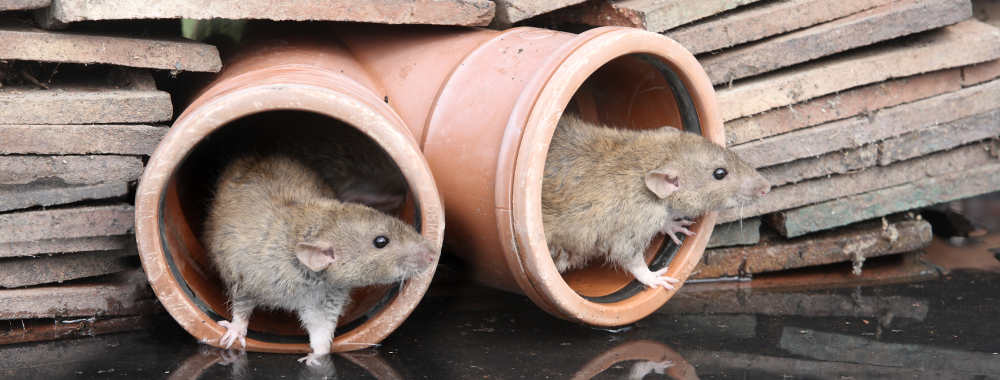Getting rid of rats in the garden
Help and advice to keep your garden rat free.
In this article we discuss a common cause of rats in the garden.
We look at your options for getting rid of rats, and explain why it is important that you take action as soon as rats move in.
Think before feeding the birds
Some of you may enjoy providing food for the birds in your garden. But if you have a rat problem, this may not be such a good idea.
Rats are highly attracted to bird food, and you may find you have taken on more dinner guests than you had bargained for!
Any rat living in the vicinity of your bird table will quickly find this excellent food source and in all probability will ‘up sticks’ and move his family into your garden. After all, it would be foolish to carry all that bird seed two hundred yards when there is a perfectly nice dry place to live under your garden shed.
More articles about treating rats
Making babies
It won’t be long before your new neighbours start a family. Rats can produce a litter of up to eight babies, not once a year, but six or more times! This extraordinary level of fecundity can turn a smallish garden into ‘rat city’ within six months.
No need for me to add that each of those babies will be starting their own families before they are four months old is there? You can find out more about these rodents by reading our article ‘all about rats‘
Moving in!
Once the space beneath your garden shed is fully occupied, your lodgers will start to think about expanding. And they won’t be waiting politely for planning permission.
Before you have even spotted them scuttling over your compost heap, your rats will be climbing up the wisteria and checking out your attic. To a rat, your attic is just a glorified ‘hollow tree’ with added extra conveniences.
And before you mention that you don’t have any wisteria, there are other ways into your attic or cellar, and rats are pretty smart opportunists when it comes to ‘breaking and entering’
Does it matter if rats share your home?
Yes it does matter. Rats spread some horrendous diseases and can cause hundreds if not thousands of pounds worth of damage to your property and building fabrics.
Not to mention the fire hazard caused when someone starts lunching on your electric cables.
So what can you do to prevent rats moving in?
Rats need food, water and shelter.
If you can prevent access to any of these three essentials, your rat problem can be solved.
Food
Don’t put bird food out on the ground. It is tempting to chuck crusts and crumbs out of the door for the birds, but please don’t. Place food in the centre of a large elevated bird table or better still, suspended in wire bird feeders.
Rats can climb but your job is to make it difficult for them. They will pick the easiest place to feed and if raiding the bird feeders in your garden involves a huge amount of effort , they’ll try their luck elsewhere
Make sure you clean up spillage – a good sized table with a raised edge helps prevent this. As you can see from our video, spillage from around a bird table is very attractive to rats. It is also a good idea to ‘site’ your feeders and tables away from nooks and crannies where rats can easily hide.
Compost heaps are attractive to rats if tasty food is thrown into them. Don’t put highly palatable food waste (like meat, cereal, cake, etc) into your compost heap, wrap it and bin it.
Water
Unlike mice, rats need a lot of water. Try to remove any containers in the garden where stagnant water can collect, old planters, bucket etc.
These all help to make the area more attractive to rats.
Be careful when handling stagnant water as rats can contaminate water with Weils disease, which can be transmitted to humans via a cut in the skin. Cover up with rubber gloves first.

Shelter
Probably the easiest of the rat’s requirements to remove. Rats need hiding places and they don’t like to be disturbed.
Clear away weeds and any junk lying around behind the shed or under the hedge. Neat and tidy gardens are far less likely to be rat infested.
Put wire mesh around the base of any raised garden buildings so that rats can’t move in underneath.
Getting help
If your rat problem persists despite these measures, you will need to have them cleared by a pest control contractor.
A professional contractor will be able to select the right rodenticide for your situation, place the baits safely without risk to your children or pets, and monitor the results effectively.
Your contractor will also give you comprehensive advice on preventing the return of the problem in the future.
Treating rats is best not attempted by householders without knowledge or expertise as accidental poisoning of pets and wildlife can easily occur when using rodenticides outside.


Hi We are very worried about rats in our garden there are SO MANY! We do back on to farmers fields and we do feed the birds. My husband has put poison down (three lots) but we still have rats. They even come out in the daytime. Also they are under the shed and seem to have made a warren in the raised garden at the side of the house. We don’t really want to stop feeding the birds but if it is neccessary to do so then we will.
Kind regards D Eley(Mrs)
We did find your website very informative
Thanks for your query, there are a number of issues that may be relevant. Is the poison bait being taken? Are the rats resistant? Is the colony bigger than you expect? And so on.
The only real advice I can give is to stop feeding the birds for the moment, and to get a professional survey of the property. If you give us a ring on 01428 714031 or email our office on admin [at] countryservicespestcontrol.co.uk (replace [at] with @) we can let you know if we are able to do this for you. There is no cost for the survey.
We did find your website very informative.